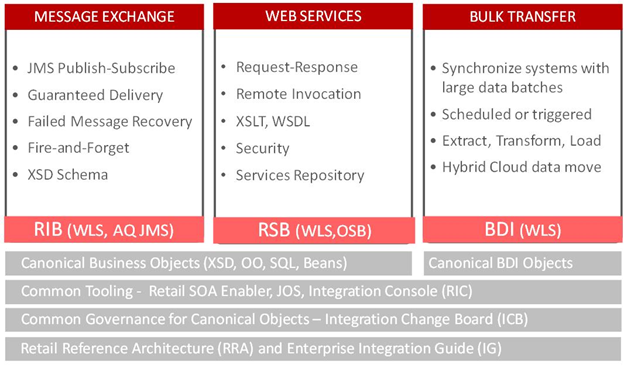1 Introduction and Executive Summary
Enterprise application integration is the process of linking applications within a single organization together in order to simplify and automate business processes to the greatest extent possible, while at the same time avoiding having to make sweeping changes to the existing applications or data structures.
There is no one integration approach that addresses all criteria equally well. There are multiple approaches for integrating applications that have evolved over time. Oracle Retail has focused on three main integration styles.
-
Asynchronous
-
Request/Response
-
Bulk Data
Oracle Retail Enterprise Integration products provide the architecture and frameworks so the applications can choose the best style for a particular integration opportunity. Each style has its advantages and disadvantages. Applications or solutions may integrate using multiple styles so that each point of integration takes advantage of the style that suits it best.
-
Asynchronous integration style (RIB)
-
Provides JMS based messaging.
-
Provides subscription style of integration.
-
Uses message queuing technology to integrate application asynchronously using either a pub-sub model or send-receive model.
-
Provides guaranteed delivery quality of service so even though messages are sent asynchronously there is assurance that messages will not get lost in transit.
-
-
Web Service integration style (RSB)
-
Uses Web Services to integrate applications.
-
Use synchronous request-response calls using SOAP technology and can be used for real time transfer of information between remote applications.
-
-
Bulk Integration style (BDI)
-
Uses batch jobs to move high volume of data from source to destination database.
-
BDI leverages the Oracle WebLogic Server provides robust infrastructure for scheduling and running batch jobs to move data.
-
This document is written to provide the assumptions and guiding principles for Enterprise Integration using the Oracle Retail Integration Cloud Service products provided by the SaaS Suite of Integration Cloud Services (RICS) and the customer applications and service that they serve.
With each style Oracle Retail has defined architectural patterns, best practices and built infrastructure products and supporting tools for the full life-cycle management of standardized, contract driven integrations. Because all integrations are contract driven, enterprise level governance is in-place to ensure consistent contracts written to published standards are followed.
Figure 1-1 Integration Styles and Integration Frameworks with Governance
